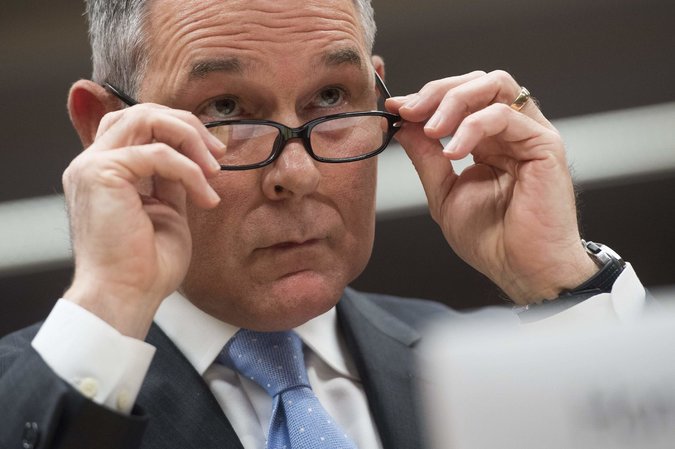EPA to Give Dissenters a Voice on Climate, No Matter the Consensus

By Brad Plumer and Coral Davenport
July 1, 2017 - Scott Pruitt, the head of the Environmental Protection Agency, plans to convene a team of researchers to test the scientific premise of human-caused climate change, he told coal industry executives on Thursday.
Speaking at a board meeting of the American Coalition for Clean Coal Electricity, a lobbying group for coal companies and their industry allies, Mr. Pruitt said his staff had already begun preparations for a “red team-blue team” exercise to challenge mainstream climate science, according to two people who attended the meeting but were not authorized to speak about it publicly.
The initiative, first reported by E&E News, is the latest in a series of moves at the E.P.A. that critics say is undermining the role of academic research at the agency charged with protecting the nation’s environment and public health.
The idea for a “red team-blue team” exercise has gained prominence among those who play down the urgency of global warming. Rick Perry, the energy secretary, endorsed the idea in a Senate hearing on Thursday.
In an op-ed for The Wall Street Journal in April, Steven Koonin, a physicist at New York University, proposed that a “red team” of dissenting scientists be established to critique major scientific reports on climate change. A “blue team” of climate scientists would then rebut the criticisms, and the resulting back-and-forth would unfold in public view.
Dr. Koonin, who was an under secretary at the Department of Energy in the Obama administration, said the process “would produce a traceable public record that would allow the public and decision makers a better understanding of certainties and uncertainties.”
He drew an analogy to red-team exercises used by the military to test assumptions and analyze risks.
Many mainstream climate scientists say the proposal would make a mockery of scientific research, which already relies on an extensive process of peer review to weed out flawed analyses.
Those scientists worry that Mr. Pruitt’s exercise will not be conducted in good faith, and will only create a platform for marginal views that have already been disproved in the normal course of scientific debate.
“I think this is fundamentally a dumb idea,” Andrew Dessler, a professor of atmospheric science at Texas A&M University, said in an email. “It’s like a red team-blue team exercise about whether gravity exists.”
Mr. Pruitt has disputed the consensus on climate change in the past. He told CNBC in March that he did not think carbon dioxide was “a primary contributor to the global warming we see,” contradicting decades of analysis by federal researchers.
He is also pushing to dismantle E.P.A. regulations around greenhouse-gas emissions and has said he wants to help the declining American coal industry.
Those actions have led many scientists to question whether Mr. Pruitt will conduct a fair-minded review of climate research.
An E.P.A. spokeswoman declined to comment.
“The key will be to see who they get to staff the teams,” Dr. Dessler said. “I can’t imagine mainstream scientists rushing to sign up for a process which is clearly a waste of time. My guess is that, in the end, many of the participants will have dubious credentials.”
Ken Caldeira, an atmospheric scientist at the Carnegie Institution for Science, agreed that the exercise was unnecessary.
“Scientists are already spending most of their time trying to poke holes in what other scientists are saying,” he said in an email. “The whole red team-blue team concept misunderstands what science is all about.”
Joseph Majkut, a climate scientist at the Niskanen Center, a libertarian think tank that supports strong action on climate change, argued that a red-team exercise, carried out fairly and rigorously, could help defuse bitter political debates over climate science.
“If we want to disarm the climate debate, we have to be willing to assume there are good intentions on the other side,” Dr. Majkut said.
He cited the example of Richard A. Muller, a physicist at the University of California, Berkeley, who was initially skeptical of temperature records that showed the earth was warming.
In 2010, Dr. Muller established a team to aggressively investigate those records, and ended up confirming the conclusions of mainstream researchers.
The consensus on climate change rests on a long history of scientific inquiry.
In the 19th century, scientists established that carbon dioxide was trapping heat at the earth’s surface, and that adding more of it to the air was likely to warm the planet.
In the 20th century, researchers proved that human activities were increasing the amount of the gas in the atmosphere and that the earth was warming in response, largely ruling out other causes of the temperature increase.
By late in that century, atmospheric scientists had concluded almost unanimously that the warming poses profound risks for human society and for the natural world.
The exact magnitude of those risks remains heavily debated, but that cuts in both directions — the scientists say the effects could be weaker or stronger than expected.
That broad understanding took decades to emerge, and all elements of it were subjected to scrutiny along the way, through the same procedures that apply to other sciences.
Climate science does have one unusual institution, however. Because the implications of the findings are so important, the nations of the world set up a committee in 1988, the Intergovernmental Panel on Climate Change, to periodically review the research and issue exhaustive summary reports.
Critics of these reports argue that dissenting voices are often excluded, which is why they favor a red-team exercise of the sort Mr. Pruitt is proposing.
Judith Curry, a climate scientist formerly at Georgia Tech, said that differing perspectives on how to frame the climate problem have been “largely ignored.”
But many scientists counter that dissenting voices do have opportunity to air their views — and have been marginalized only because their arguments have been tested over the years and found wanting.
Christopher B. Field, the head of an environmental center at Stanford University and a leading figure in the last Intergovernmental Panel on Climate Change review, said that 142,631 comments were received on the drafts of that document. Scientists responded to all of them, and some led to extensive changes in the final report.

Scott Pruitt, the head of the Environmental Protection Agency, has disputed the scientific consensus on climate change.
Photo Credit: Saul Loeb/Agence France-Presse — Getty Images

